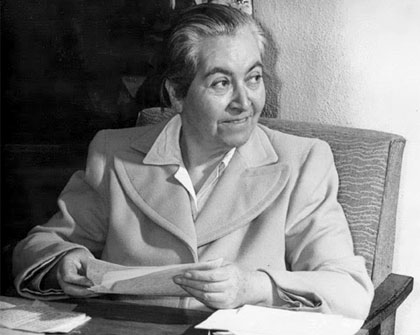Why was Gabriela Mistral Awarded the Nobel Prize for Literature in 1945?
Gabriela Mistral: Unraveling the Noble Laureate's Poetic Journey
Gabriela Mistral: A Nobel Laureate of Latin American Literature
In 1945, the Nobel Prize for Literature was bestowed upon Gabriela Mistral, a Chilean poet and educator, making her the first Latin American woman to receive this esteemed honor. Renowned for her lyrical poetry and commitment to social justice, Mistral left an indelible mark on the world of literature. This article examines the reasons behind Gabriela Mistral’s Nobel Prize win, shedding light on her poetic brilliance, profound themes, and dedication to promoting education and human rights.

1. Poetic Brilliance and Lyrical Expression:
Gabriela Mistral’s poetic brilliance was a driving force behind her Nobel Prize recognition. Her poems captivated readers with their exquisite imagery, profound emotions, and lyrical expression. Mistral had a unique ability to infuse her verses with a deep sense of sensitivity and introspection, touching upon universal themes such as love, nature, and human suffering. Her eloquence and mastery of language distinguished her as a leading voice in Latin American literature, earning her widespread acclaim.
2. Representation of Latin American Identity:
Mistral’s poetry was deeply rooted in her Latin American identity, reflecting the cultural nuances and social realities of the region. Her verses celebrated the rich cultural heritage of Latin America, paying homage to indigenous roots, folklore, and traditions. By highlighting the region’s unique identity, she contributed to the literary awakening of Latin American consciousness and its recognition on the global stage.
3. Themes of Social Justice and Human Rights:
Another significant aspect of Gabriela Mistral’s literary contributions was her unwavering commitment to social justice and human rights. Her poems often confronted issues of poverty, inequality, and oppression, advocating for the downtrodden and marginalized. Mistral’s poetry became a vehicle for raising awareness about the plight of the vulnerable and calling for social reforms. Her ability to weave advocacy and art together underscored the transformative power of literature in addressing societal issues.
4. Dedication to Education and Child Welfare:
Throughout her life, Gabriela Mistral demonstrated a deep commitment to education and child welfare. She served as an educator and administrator, striving to improve educational opportunities for children in Latin America. Mistral’s passion for nurturing young minds and fostering intellectual growth was a reflection of her belief in the transformative potential of education. Her efforts to empower future generations through knowledge and enlightenment were recognized and celebrated through the Nobel Prize.
5. Universal Appeal and International Recognition:
Gabriela Mistral’s poetry possessed a universal appeal that transcended borders and language barriers. Translations of her works introduced her poetic genius to audiences worldwide, gaining her international recognition. The Nobel Prize committee acknowledged Mistral’s ability to resonate with diverse cultures, further affirming her status as a literary luminary.
Gabriela Mistral’s Nobel Prize win in 1945 was a testament to her poetic brilliance, dedication to social justice, and commitment to education. Through her words, she breathed life into the Latin American identity and advocated for the rights of the oppressed. Mistral’s poetry continues to inspire readers with its timeless beauty and universal themes, reminding us of the enduring power of literature to ignite social change and connect hearts across the globe.




